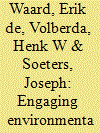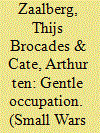| Srl | Item |
| 1 |
ID:
125103


|
|
|
|
|
| Publication |
2013.
|
| Summary/Abstract |
Since the transformation was set in motion to change Western armed forces from large-scale mechanized defensive organizations into smaller agile expeditionary crisis response forces, the call for organizational flexibility has rocketed. Yet, actual research into the key organizational drivers of flexibility has hardly been done. To bridge this gap, the present study has analyzed to what extent modular organizing and organizational sensing have contributed to flexible military crisis response performance. The study uses the Netherlands' armed forces as a representative example of a contemporary Western crisis response organization and empirically draws upon its recent operational experiences. It has uncovered that within most mission contexts, modular organizing acts as a facilitator for the organizational sensing process. Yet, within highly turbulent crisis response missions, organizational sensing becomes the predominant driver, stimulating ad hoc solutions that challenge existing structures, available technology, and standard procedures.
|
|
|
|
|
|
|
|
|
|
|
|
|
|
|
|
| 2 |
ID:
109957


|
|
|
|
|
| Publication |
2012.
|
| Summary/Abstract |
This article examines the so-called 'Dutch approach' to conducting stabilisation operations. The term is mostly used in relation to the mission carried out by the Netherlands armed forces in Afghanistan's Uruzgan province from 2006 to 2010, but actually originates in the Iraqi province of Al Muthanna. Here, a 1350-strong battle group operated from July 2003 until March 2005 as part of the US-led coalition, after which the Dutch forces left Iraq relatively unscathed and self-confident of their ability in dealing with this type of conflict. On the basis of archival research and interviews, the authors unravel the 'Dutch approach' in southern Iraq by tracing its roots and by examining the Dutch operation in the context of the American and British experiences. They argue that despite predominantly effective tactical reflexes and an overall adequately broad interpretation by battle group commanders of a too narrowly defined political mandate, stability in Al Muthanna was conditions-driven rather than the result of a unique and effective approach. The term 'Dutch approach' turned out to be a convenient fabrication which, after the relatively successful mission in Al Muthanna, became increasingly politicised in the run-up to a dangerous new operation in southern Afghanistan.
|
|
|
|
|
|
|
|
|
|
|
|
|
|
|
|
| 3 |
ID:
127174


|
|
|
|
|
| Publication |
2013.
|
| Summary/Abstract |
This article argues that there is little evidence supporting the existence of the often praised, and allegedly subtle and successful 'Dutch approach' to stabilisation and counter-insurgency operations in Iraq or Afghanistan. It denounces the uncritical use of the term and refutes suggestions of historical and cultural roots to such an approach, for instance in Dutch colonial warfare in the Indonesian archipelago. It concludes by explaining the true conditions that gave rise to this notion, which seems to feed into a gratifying national self-image of the Dutch as non-martial, conflict averse and tolerant, rather than offering an original and successful formula for countering insurgencies.
|
|
|
|
|
|
|
|
|
|
|
|
|
|
|
|